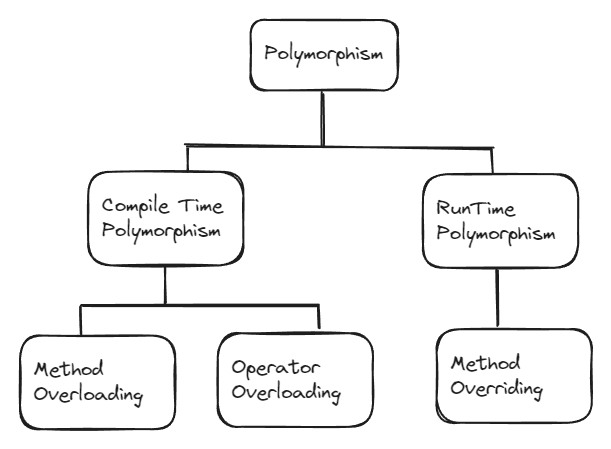Polymorphism
Table of Content
- ability of a message to be represented in many forms.
- Polymorphism in Java can be achieved in two ways i.e., method overloading and method overriding.
- Polymorphism in Java is mainly divided into two types.
- Compile-time polymorphism
- Runtime polymorphism
- Compile-time polymorphism can be achieved by method overloading
- Runtime polymorphism can be achieved by method overriding.

Subtyping
- concept in object-oriented programming that allows a variable of a base class to reference a derived class object. This is called polymorphism, because the variable can take on many forms.
- The variable can be used to call methods that are defined in the base class, but the actual implementation of the method is defined in the derived class.
- Eg
1
2
3
4
5
6
7
8
9
10
11
public class User {
private String name;
private String email;
}
public class Student extends User {
private String batchName;
private Integer psp;
}
User user = new Student();
Method Overloading (Compile time polymorphism)
- feature that allows a class to have more than one method having the same name, if their argument lists are different.
- It is similar to constructor overloading in Java, that allows a class to have more than one constructor having different argument lists.
1
2
3
4
5
6
7
8
9
10
11
12
public class User {
private String name;
private String email;
public void printUser() {
System.out.println("Name: " + name + ", Email: " + email);
}
public void printUser(String name, String email) {
System.out.println("Name: " + name + ", Email: " + email);
}
}
- The compiler distinguishes these two methods by the number of parameters in the list and their data types. The return type of the method does not matter.
Method Overriding (Runtime polymorphism)
- Runtime polymorphism is also called Dynamic method dispatch. Instead of resolving the overridden method at compile-time, it is resolved at runtime.
1
2
3
4
5
6
7
8
9
10
11
12
13
14
15
16
17
18
19
public class User {
private String name;
private String email;
public void printUser() {
System.out.println("Name: " + name + ", Email: " + email);
}
}
public class Student extends User {
private String batchName;
private Integer psp;
@Override
public void printUser() {
System.out.println("Name: " + name + ", Email: " + email + ",
Batch: " + batchName + ", PSP: " + psp);
}
}
Advantages of Polymorphism
- Code reusability is the main advantage of polymorphism; once a class is defined, it can be used multiple times to create an object.
Problems with Polymorphism
- Implementing code is complex because understanding the hierarchy of classes and its overridden method is quite difficult.
- Runtime polymorphism can lead to the real-time performance issue (during the process), it basically degrades the performances as decisions are taken at run time because, machine needs to decide which method or variable to invoke
Interface
- similar to a class, but it cannot be instantiated.
- It can contain only constants, method signatures, default methods, static methods, and nested types.
- Method bodies exist only for default methods and static methods.
- can be thought of as a blueprint of behavior.
- It is used to achieve abstraction and multiple inheritance in Java.
Why use an interface?
- It is used to achieve abstraction.
- Due to multiple inheritance, it can achieve loose coupling.
- Define a common behavior for unrelated classes.
1
2
3
4
5
6
7
8
9
10
11
12
13
14
15
16
17
18
19
20
21
22
23
24
public interface Person {
String getName();
String getEmail();
}
public class User implements Person {
private String name;
private String email;
public User(String name, String email) {
this.name = name;
this.email = email;
}
@Override
public String getName() {
return name;
}
@Override
public String getEmail() {
return email;
}
}
These are my notes from the Low-Level Design (LLD) course I took at Scaler.
Check Python, Java and Go code on Github Repo